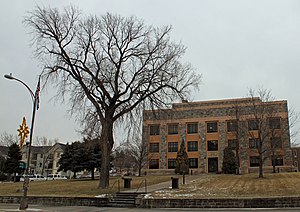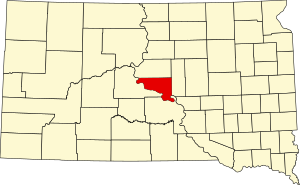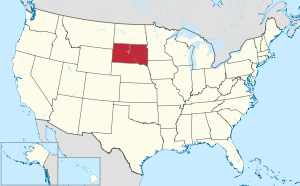Hughes County is a county in the U.S. state of South Dakota. As of the 2020 census, the population was 17,765, making it the least populous capital county in the nation, and the 12th most populous county in South Dakota.[1] Its county seat is Pierre,[2] which is also the state capital. The county was created in 1873, and was organized in 1880. It was named for Alexander Hughes, a legislator.[3] On June 4, 1891, the county's area was increased by the addition of Farm Island, in the Missouri River downstream of Pierre.[4]
Hughes County | |
|---|---|
 Hughes County Courthouse in Pierre | |
 Location within the U.S. state of South Dakota | |
 South Dakota's location within the U.S. | |
| Coordinates: 44°23′N 99°59′W / 44.39°N 99.99°W | |
| Country | |
| State | |
| Founded | January 8, 1873 (created) November 26, 1880 (organized) |
| Named for | Alexander Hughes |
| Seat | Pierre |
| Largest city | Pierre |
| Area | |
• Total | 801 sq mi (2,070 km2) |
| • Land | 742 sq mi (1,920 km2) |
| • Water | 59 sq mi (150 km2) 7.4% |
| Population (2020) | |
• Total | 17,765 |
• Estimate (2023) | 17,624 |
| • Density | 22/sq mi (8.6/km2) |
| Time zone | UTC−6 (Central) |
| • Summer (DST) | UTC−5 (CDT) |
| Congressional district | At-large |
| Website | www |
Hughes County is part of the Pierre, SD Micropolitan Statistical Area.
Geography
editThe Missouri River forms the southwestern boundary line of Hughes County. The county's terrain consists of rolling hills cut by gullies and drainages. The area is partially dedicated to agriculture, including the use of center pivot irrigation.[5]
The county terrain generally slopes to the southeast, although the hills along the west fall off into the river valley. The county's highest point is on the upper part of the east boundary line, at 1,952 ft (595 m) ASL.[6] The county has a total area of 801 square miles (2,070 km2), of which 742 square miles (1,920 km2) is land and 59 square miles (150 km2) (7.4%) is water.[7]
Major highways
editAirport
editPierre Regional Airport (PIR) serves Hughes County and the surrounding communities.
Adjacent counties
edit- Sully County - north
- Hyde County - east
- Lyman County - south
- Stanley County - west
Protected areas
editSource:[5]
- Arikara State Game Production Area
- Buckeye State Game Production Area
- Cowan State Game Production Area
- DeGrey State Game Production Area
- DeGrey State Lakeside Use Area
- Dry Run State Game Production Area
- East Shore State Lakeside Use Area
- Farm Island State Recreation Area
- Fort George State Game Production Area
- Fort George State Lakeside Use Area
- Gutenkauf State Game Production Area
- Joe Creek Recreation Area
- LaFramboise Island State Nature Area
- North Bend State Lakeside Use Area
- North Big Bend State Game Production Area
- Oahe Mission Recreation Area
- Peoria Flats State Game Production Area
- Peoria Flats State Lakeside Use Area
- Rousseau State Game Production Area
- Rousseau State Lakeside Use Area
- Sand Creek State Game Production Area
- Spring Creek State Recreation Area
- Tailrace Recreation Area
- Valley state Game Production Area
- West Bend State Recreation Area
- West Big Bend State Game Production Area
- West DeGrey State Game Production Area
- Woodruff Lake State Game Production Area
Lakes
editSource:[5]
- Lake Oahe (part)
- Lake Sharpe (part)
- Woodruff Lake
Demographics
edit| Census | Pop. | Note | %± |
|---|---|---|---|
| 1880 | 268 | — | |
| 1890 | 5,044 | 1,782.1% | |
| 1900 | 3,684 | −27.0% | |
| 1910 | 6,271 | 70.2% | |
| 1920 | 5,711 | −8.9% | |
| 1930 | 7,009 | 22.7% | |
| 1940 | 6,624 | −5.5% | |
| 1950 | 8,111 | 22.4% | |
| 1960 | 12,725 | 56.9% | |
| 1970 | 11,632 | −8.6% | |
| 1980 | 14,220 | 22.2% | |
| 1990 | 14,817 | 4.2% | |
| 2000 | 16,481 | 11.2% | |
| 2010 | 17,022 | 3.3% | |
| 2020 | 17,765 | 4.4% | |
| 2023 (est.) | 17,624 | [8] | −0.8% |
| U.S. Decennial Census[9] 1790-1960[10] 1900-1990[11] 1990-2000[12] 2010-2020[1] | |||
2020 census
editAs of the 2020 census, there were 17,765 people, 7,240 households, and 4,506 families residing in the county.[13] The population density was 24.0 inhabitants per square mile (9.3/km2). There were 7,922 housing units.
2010 census
editAs of the 2010 census, there were 17,022 people, 7,066 households, and 4,435 families in the county. The population density was 23.0 inhabitants per square mile (8.9/km2). There were 7,623 housing units at an average density of 10.3 per square mile (4.0/km2). The racial makeup of the county was 85.7% white, 10.5% American Indian, 0.5% black or African American, 0.5% Asian, 0.5% from other races, and 2.3% from two or more races. Those of Hispanic or Latino origin made up 1.8% of the population. In terms of ancestry, 42.7% were German, 12.4% were Norwegian, 9.8% were Irish, 9.7% were English, and 3.8% were American.
Of the 7,066 households, 30.2% had children under the age of 18 living with them, 49.5% were married couples living together, 9.4% had a female householder with no husband present, 37.2% were non-families, and 32.3% of all households were made up of individuals. The average household size was 2.30 and the average family size was 2.90. The median age was 39.8 years.
The median income for a household in the county was $53,501 and the median income for a family was $70,881. Males had a median income of $42,701 versus $32,265 for females. The per capita income for the county was $28,236. About 7.1% of families and 9.3% of the population were below the poverty line, including 14.5% of those under age 18 and 6.0% of those age 65 or over.
Politics
editHughes is a strongly Republican county in Presidential and Congressional elections. The last Democrat to win a majority in the county was Franklin D. Roosevelt in 1936. In 2012, Republican Mitt Romney won 64% of the county's vote.
| Year | Republican | Democratic | Third party(ies) | |||
|---|---|---|---|---|---|---|
| No. | % | No. | % | No. | % | |
| 2020 | 5,522 | 63.30% | 2,953 | 33.85% | 248 | 2.84% |
| 2016 | 5,174 | 63.29% | 2,450 | 29.97% | 551 | 6.74% |
| 2012 | 5,219 | 64.00% | 2,786 | 34.16% | 150 | 1.84% |
| 2008 | 5,298 | 62.56% | 3,037 | 35.86% | 133 | 1.57% |
| 2004 | 6,017 | 68.10% | 2,697 | 30.53% | 121 | 1.37% |
| 2000 | 5,188 | 68.86% | 2,212 | 29.36% | 134 | 1.78% |
| 1996 | 4,469 | 56.80% | 2,788 | 35.43% | 611 | 7.77% |
| 1992 | 4,325 | 53.26% | 2,578 | 31.74% | 1,218 | 15.00% |
| 1988 | 4,545 | 61.07% | 2,853 | 38.34% | 44 | 0.59% |
| 1984 | 4,985 | 70.32% | 2,072 | 29.23% | 32 | 0.45% |
| 1980 | 4,652 | 66.00% | 1,751 | 24.84% | 645 | 9.15% |
| 1976 | 3,997 | 61.15% | 2,506 | 38.34% | 33 | 0.50% |
| 1972 | 4,231 | 67.35% | 2,037 | 32.43% | 14 | 0.22% |
| 1968 | 3,204 | 61.46% | 1,666 | 31.96% | 343 | 6.58% |
| 1964 | 2,732 | 51.18% | 2,606 | 48.82% | 0 | 0.00% |
| 1960 | 3,320 | 61.99% | 2,036 | 38.01% | 0 | 0.00% |
| 1956 | 2,923 | 63.41% | 1,687 | 36.59% | 0 | 0.00% |
| 1952 | 2,932 | 75.86% | 933 | 24.14% | 0 | 0.00% |
| 1948 | 1,739 | 61.43% | 1,080 | 38.15% | 12 | 0.42% |
| 1944 | 1,676 | 64.12% | 938 | 35.88% | 0 | 0.00% |
| 1940 | 1,982 | 59.27% | 1,362 | 40.73% | 0 | 0.00% |
| 1936 | 1,547 | 46.71% | 1,662 | 50.18% | 103 | 3.11% |
| 1932 | 1,374 | 42.02% | 1,852 | 56.64% | 44 | 1.35% |
| 1928 | 1,912 | 61.56% | 1,171 | 37.70% | 23 | 0.74% |
| 1924 | 1,260 | 53.21% | 325 | 13.72% | 783 | 33.07% |
| 1920 | 1,313 | 68.31% | 433 | 22.53% | 176 | 9.16% |
| 1916 | 611 | 51.13% | 536 | 44.85% | 48 | 4.02% |
| 1912 | 0 | 0.00% | 544 | 50.51% | 533 | 49.49% |
| 1908 | 795 | 66.64% | 349 | 29.25% | 49 | 4.11% |
| 1904 | 929 | 72.18% | 335 | 26.03% | 23 | 1.79% |
| 1900 | 537 | 65.65% | 272 | 33.25% | 9 | 1.10% |
| 1896 | 462 | 58.19% | 327 | 41.18% | 5 | 0.63% |
| 1892 | 459 | 62.88% | 102 | 13.97% | 169 | 23.15% |
In the South Dakota Senate Hughes is part of the 24th Senate district, which is held by Republican Bob Gray. In the State House Hughes is part of district 24, which is held by Republicans Tad Perry and Mark Venner.
Communities
editCities
editTown
editCensus-designated place
editUnincorporated communities
editTownships
edit- Raber
- Valley
Unorganized territories
edit- Crow Creek
- North Hughes
- West Hughes
Education
editSchool districts include:[15]
See also
editReferences
edit- ^ a b "State & County QuickFacts". United States Census Bureau. Retrieved March 21, 2024.
- ^ "Find a County". National Association of Counties. Archived from the original on May 31, 2011. Retrieved June 7, 2011.
- ^ Gannett, Henry (1905). The Origin of Certain Place Names in the United States. Govt. Print. Off. p. 162.
- ^ "Dakota Territory, South Dakota, and North Dakota: Individual County Chronologies". Dakota Territory Atlas of Historical County Boundaries. The Newberry Library. 2006. Archived from the original on April 2, 2018. Retrieved March 29, 2015.
- ^ a b c "Hughes County · South Dakota". Google Maps. Retrieved April 27, 2024.
- ^ ""Find an Altitude" Google Maps (accessed February 3, 2019)". Archived from the original on May 21, 2019. Retrieved February 4, 2019.
- ^ "2010 Census Gazetteer Files". United States Census Bureau. August 22, 2012. Retrieved March 26, 2015.
- ^ "County Population Totals and Components of Change: 2020-2023". Retrieved March 17, 2024.
- ^ "U.S. Decennial Census". United States Census Bureau. Retrieved March 26, 2015.
- ^ "Historical Census Browser". University of Virginia Library. Retrieved March 26, 2015.
- ^ Forstall, Richard L., ed. (March 27, 1995). "Population of Counties by Decennial Census: 1900 to 1990". United States Census Bureau. Retrieved March 26, 2015.
- ^ "Census 2000 PHC-T-4. Ranking Tables for Counties: 1990 and 2000" (PDF). United States Census Bureau. April 2, 2001. Archived (PDF) from the original on October 9, 2022. Retrieved March 26, 2015.
- ^ "US Census Bureau, Table P16: Household Type". United States Census Bureau. Retrieved March 21, 2024.
- ^ Leip, David. "Atlas of US Presidential Elections". uselectionatlas.org. Retrieved April 15, 2018.
- ^ "2020 CENSUS - SCHOOL DISTRICT REFERENCE MAP: Hughes County, SD" (PDF). United States Census Bureau. Retrieved March 13, 2024. - Text list